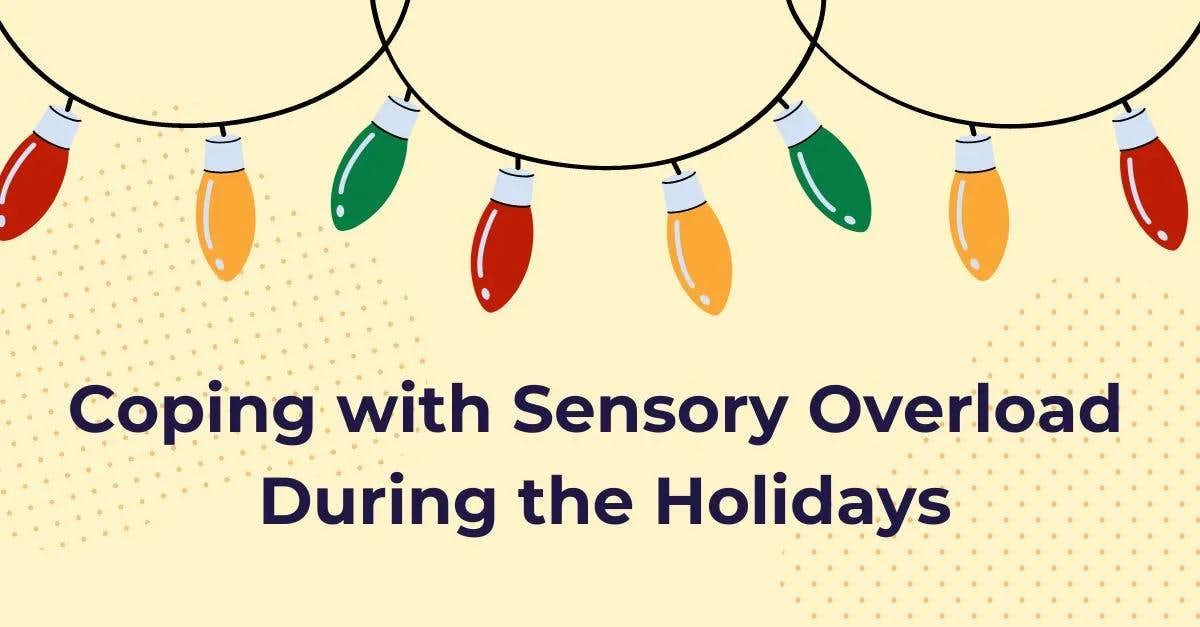December 6th, 2022

For many, the holidays are a fun time full of family, friends, traditions, and parties. However, for some, this time of year can cause increased anxiety due to all the changes that come about during the holiday season. Children, and adults, may need extra support when their senses become overloaded by all the excitement the holidays prompt. Keep reading to learn how you can help a loved one, a close family/friend, or yourself, who may be struggling with sensory overload during the upcoming celebrations.

Sensory overload is when the brain becomes overwhelmed by too much environmental stimulation to any of the senses (vision, hearing, smell, taste, and touch). When your brain cannot process certain stimuli, your body will react with atypical behaviors. More so, sensory overload can happen to anyone! Sensory sensitivity, however, is more likely to be seen in people who are neurodivergent compared to neurotypical people. Examples of people who are neurodivergent are those with sensory processing disorders, attention disorders, social anxiety, autism spectrum disorder, down syndrome, and more.
JCFS Chicago states that a few likely circumstances that can cause sensory overload are the following:
If you know someone who experiences sensory overload, please remain cognizant of sensory-stimulating environments and work with them (not against them) to limit exposure. If you are someone who experiences sensory overload, be aware of your triggers so you can prepare accordingly.
People who are triggered by excessive environmental stimulation will respond in ways that warn themselves, and others, that they need to take some time to calm down. HASA reported that increased physical activity, efforts to drain out sound, self-injurious behaviors, aggression towards others, outbursts/meltdowns/tantrums, and abnormal withdrawal can be warning signs of sensory overload or overstimulation. Being aware that these behaviors are responses to too many stimuli is helpful so measures can be taken to reduce overstimulation. Again, if you are the person experiencing sensory overload, communicating your needs with family and friends is imperative to an enjoyable holiday experience.

There are certain precautions you can take to avoid sensory-induced anxiety during holiday festivities:
If, however, the above precautions are ineffective, HASA recognized the following as effective coping skills to manage sensory overload:

If you are the person who is always responsible for throwing holiday parties, and every family/friend group has one, you have stumbled into the right place! Even if you are not aware of someone in your circle triggered by sensory overload, that does not mean that someone doesn’t experience such sensitivity. Here are some tips from JCFS Chicago to keep your party joyful this holiday season:
Remember, the holidays don’t have to be overstimulating and unenjoyable. By knowing triggers, warning signs, and effective ways to deal with sensory overload, your holidays too can be merry and bright!
Written By: Autumn Holtschlag, LPC, ALMFT
At Clarity Clinic, we have highly trained staff who specialize in therapy and psychiatry services. To learn more about how we can support your mental health, call Clarity Clinic at (312) 815-9660 or schedule an appointment today.
Our Services
Virtual/Online CarePHP and IOPAdult PsychiatryChild & Adolescent PsychiatryAdult TherapyChild & Adolescent TherapyCouples CounselingFamily TherapyGroup TherapyPsychological TestingTranscranial Magnetic Stimulation (TMS)